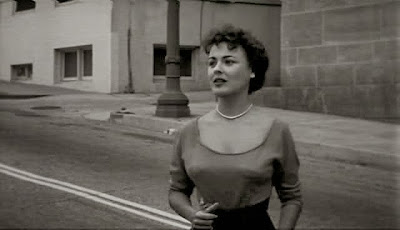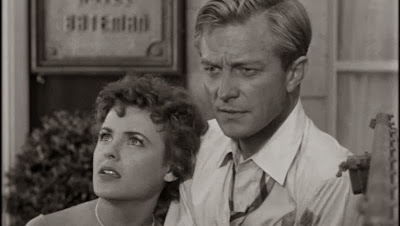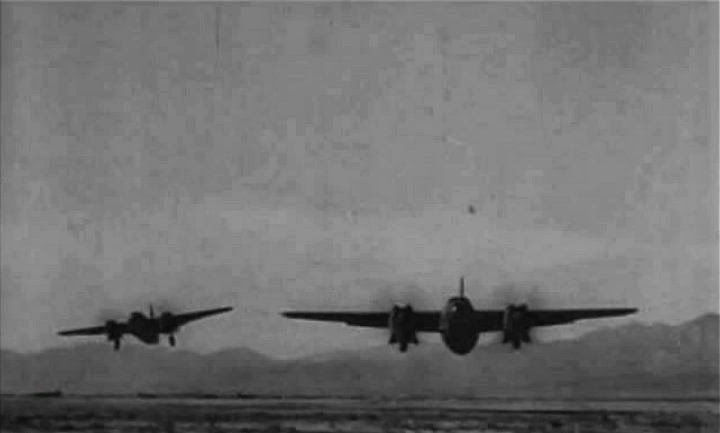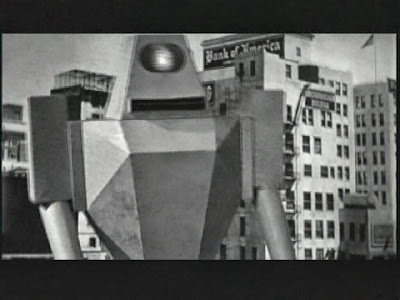
B-Grade sci-fi meets gangster movie meets pulp fiction
Directed by Sherman A. Rose
Produced by Herman Cohen
Written by Paul W. Fairman, James H. Nicholson, Wyott Ordung, William Raynor
Music by Paul Dunlap
Cinematography: Guy Roe
Editing by Sherman A. Rose
Distributed by Allied Artists Pictures Corporation
Running time: 75 minutes
Budget: $100,000
Cast
Kathleen Crowley (Nora King)
Richard Denning (Frank Brooks)
Virginia Grey (Vicki Harris)
Richard Reeves (Jim Wilson)
Robert Roark (Davis, the Killer)
Whit Bissell (Tom, Chief research scientist)
Arthur Space (Lt. General Wood)
Steve Pendleton (Colonel)
Mort Marshall (Charles Otis)
Storyline
A large city in the US is almost completely evacuated as an advanced force of robots, conjectured to be from the planet Venus, invade and attack. Nora King and Frank Brooks, are among the few who have been overlooked during the mass evacuation. Together with two others they meet, Vicki Harris and Jim Wilson, they face not only the danger from the Venusian robots, but also new dangers in the form of Davis, a psychopathic killer, as well as potential death from “friendly fire.”
Trailer

Spoilers follow below:
The Story
During the opening credits of the film, Target Earth, we find ourselves gradually freefalling through the immensity of space toward the planet Earth. We then zero in on a single city and are finally drawn into a nondescript single room of a rooming house.
Room
The camera focusses on a clock that reads 1.30 and it must be PM since even though the room appears to be in semi-darkness, it is daytime beyond the drawn window blind. The camera then pans to a mirror in which we see the reflection of a woman asleep in her underclothing. We are then given a close-up of a bottle of Dr Andrews sleeping tablets lying opened next to her.
By purely visual means, the audience is invited to mentally join the dots, ask questions and ponder the possible reasons behind this lady’s obvious suicide attempt.
The character, Nora King recovers consciousness and soon discovers that her building has no electricity or water upon which modern civilisation depends for its existence. She is greeted only by an unnerving silence and a view of a streetscape devoid of the human heart and soul that is the lifeblood of any urban setting.
Some people like Nora might wish to die alone, but to live and to be alone-that is something else! How unnerved she must have felt knocking on doors and calling out “Mrs Gordon!” and “Where is everybody?” only to be met by the silent response of total human absence.
Street




As Frank and Nora walk to the city centre, they try to figure out what has happened to the city’s inhabitants. By a process of elimination, they determine that it was probably not the result of a nuclear bomb or germ warfare. As to their own presence in the city, Frank uses the analogy of a sack of sugar to explain it whereby some of the gains seem to always stick to the sack.
Restaurant

Almost unbelievably considering the circumstances, Frank and Nora hear music coming from inside a restaurant. Inside they find a woman, Vicki Harris, playing the piano as her male companion, Jim Wilson, mixes her a drink. Both are rather inebriated and have been “celebrating as though it’s New Year’s Eve.” How differently people react to being placed in similar circumstances!
And the choices they make! For this quartet, the choices boil down to getting out of town or staying and enjoy what’s on offer. They decide to keep on the move by supposedly visiting other night spots.
Street
When they attempt to take a car, the owner’s dead body almost falls out the open door. This is a stark reminder that even in the face of human catastrophes and calamities, objects, artefacts and places were once owned and used by living people with flesh and blood histories and stories to tell.
Suddenly, the four are interrupted by a man, Charles Otis, who explains that he was “trying to get out town, like yourselves.” He had also been checking the cars and discovered that they have all been disabled by having the distributor caps removed.
Otis also says that the area he just came from appeared to have been heavily looted. His description of what has taken place allows the audience to use their imaginations to picture the scene of destruction: the “mess”, smashed windows and so on.
The audience is again invited to use their imagination when the group witness the giant shadow (“it doesn’t look human!”) of a monstrous figure being cast on the side of a tall building. How the human mind has the capacity to create phantoms and monsters from mere shadows as the brain struggles to make sense of the unknown and unfamiliar!
Hotel Lobby

Intriguingly, Frank mentions that he has a desk at the “Home Office” which suggests that he is employed by the government. I’m not sure if this is the equivalent of the State Department or like the UKs Home Office which these days is responsible for immigration, security, and law and order, including the police, UK Border Agency, and the Security Service (MI5). We also have further insight into Frank’s background when he suggests that the robot invasion force is “part of an advance patrol” as per his experience in the “last war.”
Seeking a more secure hiding place, the quartet move from the hotel lobby to a suite (402 – 404) on the fourth floor.
Army command post
The discussion between a general and his colleagues paints a fuller picture as to the nature of the enemy and what has been occurring off-screen so far: They are dealing with an “enemy, the likes of which defies description,” that “the invasion was not launched by a power on this earth” and that “the consensus is that they came from Venus.”


We learn that the invaders have already destroyed an airborne division as well as twenty-four planes from bomber command.
Hotel
As the film, Target Earth is more about character than scientific accuracy; Nora’s revelation to Frank about her suicide attempt is significant. She declares that she wouldn’t care if they dropped the H-Bomb and that she “never intended to wake up at all.” We learn that her husband was killed in a car crash and that she blamed herself for his death with the result that she felt that she didn’t have a reason to live. Now, with the current threat to humanity’s existence, everything has changed for Nora, except that it seems to be “too late to do anything about it.”
What of the other characters that have been thrown into this situation? Vicki and Jim, who have been seeing each other for ten years constantly bicker and squabble. Jim uncharacteristically offers to help Frank find food and Vicki observes that yesterday he wouldn’t have given her a seat on a bus. Jim retorts by stating, “Today the busses aren’t running anymore.” Later on Jim declares to Vicki that “if we ever get out of this dive, we’ll do all our fighting from the same corner.” It’s amazing what a crisis can do to put things into perspective and enable people to work out what really is important in life.
Army command post
The general wouldn’t be a military man if didn’t order atomic artillery and guided missiles to be readied and that’s exactly what he does. Just then he receives news that (as luck would have it) a deactivated robot has been found. This looks like a job for a team of scientists to attempt to discover what has caused the robot to become inoperative.

Laboratory
The chief scientist determines that the robots are driven by electro-magnetic impulses, that they can duplicate human motion, are impervious to bullets and are “incapable of pain, fear or compassion.” Qualities expressed by later screen robotic descendants such as Cybermen, Terminators and so on.

Hotel
Back at the hotel, another character has been thrown into the mix in the form of a psychotic killer named Davis, who escaped from custody during the evacuation. He has broken into the suite and holds the group at gunpoint. He states that he “wouldn’t stand a chance alone and without a gun.” He informs Nora that he knows a way out of the city by means of a sewer and intends for her to accompany him. He also intends to use the others as decoys.
Laboratory
Science to the rescue! Hurrah! A means seems to have been discovered to destroy the lethal, beam-generating, cathode ray tube located in the robots' heads.
Hotel Lobby


Hotel Roof




Points Of Interest

The movie, Target Earth was based on the 1953 short story, "Deadly City" by Paul W. Fairman.

Target Earth was sneakily filmed on the deserted streets of Los Angeles early one Sunday morning, without the necessary permits. The film's story, however, is based in Chicago.
I know there are those critics out there who salivate at the prospect of pointing out the film’s low budget, lack of sophisticated special effects and so on. For me the main feature of the film is its basic premise: An assorted group of people finding themselves in an abandoned city, being forced to contend with an alien menace and having to make choices that have significant personal and collective consequences.







I've always liked this film. I've also always wondered if the writer(s) had some message inside the film - perhaps a political message.
ReplyDeleteBut good special effects did exist before this film. Case in point The Wizard Of Oz (The tornado scene and the fake wizard himself in 3d fishbowl like motion in color). I do like the film, script and great acting. Thanks for the review and keep watching the skies....especially now full of chemtrails yipes!!
ReplyDelete